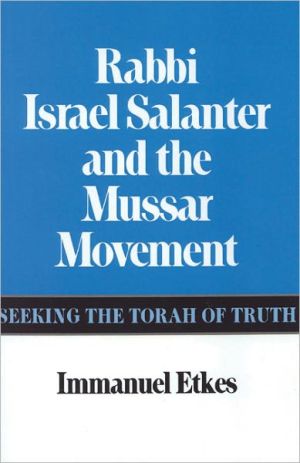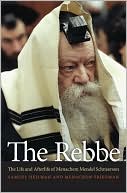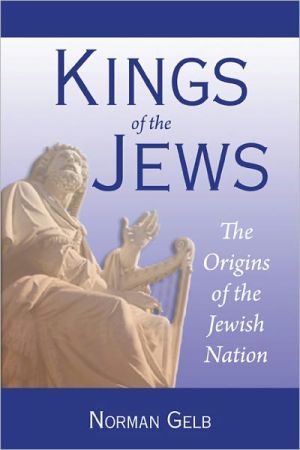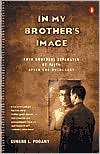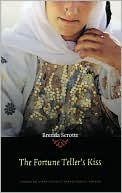Rabbi Israel Salanter and the Mussar Movement: Seeking the Torah of Truth
Israel Salanter was one of the most original and influential Jewish leaders and thinkers of Eastern European Jewry in the modern period. One of Salanter’s most striking innovations was the transformation of the issue of ethics from the domain of theology to the realm of psychology. Immanuel Etkes traces Salanter’s unique view of Mussar doctrine, especially his introduction of modern psychology to the traditional understanding of personal ethical development.
Search in google:
Israel Salanter was one of the most original and influential Jewish leaders and thinkers of Eastern European Jewry in the modern period. This biography makes available to the English-speaking public - for the first time - a systematic discussion of his thought and deeds, which had a profound impact on traditional Judaism. One of Salanter's most striking innovations was the transformation of the issue of ethics from the domain of theology to the realm of psychology. Immanuel Etkes traces Salanter's unique view of Mussar doctrine, especially his introduction of modern psychology to the traditional understanding of personal ethical development. The author begins by tracing Salanter's predecessors - the Vilna Gaon, Rabbi Hayyim of Volozhin, and Rabbi Zundel of Salant, Rabbi Israel's teacher. He then places the Mussar movement within its historic and cultural context: on the Jewish scene, with Hasidism and the Haskalah; and on the Russian scene, with the dual pressures of political repression and the cultural lure of secular assimilation. One can see the establishment of the Mussar Movement as a reaction to the increased strength of the Haskalah movement and the secularization that came with it. In fact, Salanter is portrayed as one of the first leaders of Eastern Europe's Jewish Orthodoxy - orthodoxy in the sense of a traditional society gaining awareness of the threat against tradition, preparing to defend it. This struggle itself, however, often assumed a modern character, not unlike the phenomena it was combating. This characterization befits Salanter, who made use of modern methods, like psychology, in his struggle for the triumph of tradition. Etkes's notes make accessible some of the technical terms that may be unfamiliar to readers new to this chapter of Jewish history.
Significant DatesMapIntroduction3Pt. 1The Theoretical Roots of Rabbi Israel Salanter's Teaching1The Genealogy of the Mussar Movement132The Fear of God in the Thought of Rabbi Elijah of Vilna173Torah and the Fear of God in the Thought of Rabbi Hayyim of Volozhin304Rabbi Zundel Salant as the Embodiment of the Educational Ideal of the Volozhin Yeshiva575The Encounter Between Rabbi Israel Salanter and Rabbi Zundel Salant68Pt. 2Vilna, 1840-496The Dissemination of Torah and Laying the Foundation for the Mussar Movement797Salanter's Mussar Doctrine - The Points of Departure and the Initial Stages918The First Cell of the Mussar Movement in Vilna108Pt. 3The Founding of the Mussar Movement: Historical Background9Rabbi Israel Salanter's Intellectual Sources11710The Intensification of the Haskalah Movement in Russia and the Founding of the Mussar Movement13511The Social Background and Its Influence Upon the Founding of the Mussar Movement153Pt. 4Kovna, 1849-5712The Growth of the Mussar Movement in Lithuania During the 1850s17713Salanter's Thought in the 1850s: The "Mussar Epistle"20014Theory and Practice in the Cultivation of Scholars and Rabbis21315Mussar Education in the Nevyozer Kloiz229Pt. 5The Period of Wanderings, 1857-8316Salanter in the Jewish Communities of Western Europe24117Strengthening Orthodox Society in Russia25618The Mussar Doctrine, 1859-81289Epilogue313Notes325Bibliography373Index381
